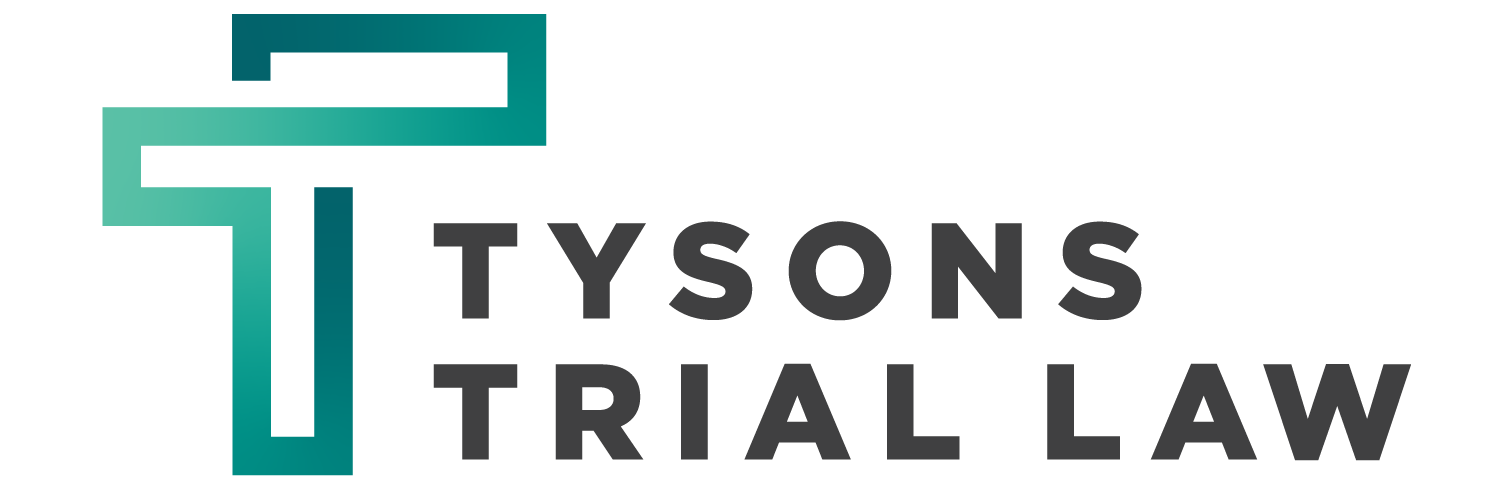Northern Virginia Personal Injury Lawyer
An accident in Northern Virginia can leave you with serious injuries, mounting medical bills, and uncertainty about the future.
A Northern Virginia personal injury attorney from Tysons Trial Law, PLLC, understands local laws and insurance company tactics. We guide you through the claims process and fight for the compensation you deserve.
Our attorneys handle injury claims arising from car accidents, slip and falls, medical malpractice, and other negligent acts. We build your case to recover damages for your medical treatment, lost income, and pain and suffering. Protect your rights by consulting our firm early in your case. Call Tysons Trial Law, PLLC, at (703) 888-5535 for your free consultation.

Practice Areas
-
- Personal Injury
- Car Accident
- Truck Accident
- Motorcycle Accident
- Bicycle Accident
- Pedestrian Accident

How We Pursue Your Personal Injury Compensation
The path to receiving compensation requires several steps. After you seek medical attention for your injuries, your lawyer begins building your case.
Our team gathers critical evidence, such as medical records, witness statements, accident reports, and expert testimony. We use this evidence to establish the other party’s liability and calculate the full extent of your damages. These damages often include your current and future medical bills, lost wages, diminished earning capacity, and pain and suffering.
We then present a detailed demand to the insurance company and negotiate for a fair settlement. While we resolve many cases through negotiation, we prepare every case for trial. If the insurance company refuses to offer a fair settlement, our litigators will file a lawsuit and advocate for you in court.
Personal Injury Cases in Northern VA
A personal injury refers to physical, emotional, or psychological harm suffered by an individual due to the negligent or intentional actions of another person, company, or entity. Common examples include injuries from:
- Car accidents
- Slip and falls
- Medical malpractice
- Workplace incidents
Personal injury law—also known as tort law—allows the injured party to seek compensation for damages such as medical expenses, lost earnings, pain and suffering, and other related costs.
To have a valid personal injury claim, the injured person must typically prove that the other party owed them a duty of care, breached that duty, and caused harm as a direct result. These cases can range from minor injuries to life-altering conditions. Whether it's a broken bone, a concussion, or long-term disability, personal injury law exists to help victims recover financially and hold wrongdoers accountable for their actions or inaction.


The Role of Negligence in a Personal Injury Case
Negligence is a fundamental concept in most personal injury cases. It occurs when someone fails to exercise reasonable care, resulting in harm to another person. To successfully pursue a personal injury claim based on negligence, the injured party (plaintiff) must prove that the defendant owed a duty of care, breached that duty, and caused the injury as a direct result.
First, the plaintiff must show that the defendant had a legal obligation to act with reasonable care. For example, drivers must obey traffic laws to keep others safe. Next, the plaintiff must prove that the defendant breached this duty, perhaps by running a red light or failing to maintain a safe property condition. Finally, the plaintiff must demonstrate that this breach directly caused their injury and that actual damages occurred, like medical bills or lost income.
Negligence differs from intentional harm because it involves carelessness rather than deliberate wrongdoing. However, proving negligence can be complex, requiring evidence such as eyewitness testimony, expert opinions, and accident reports.
Understanding negligence is crucial in personal injury cases because it establishes liability. If negligence is proven, the injured party may be entitled to compensation for medical expenses, pain and suffering, and other losses related to the injury.
How to Receive Compensation for a Personal Injury
Receiving compensation for a personal injury involves several important steps, starting with documenting your injury and the circumstances surrounding it. Immediately after an accident, seek medical attention to treat your injuries and create a medical record. This documentation is crucial evidence to support your claim.
Next, report the incident to the responsible party or their insurance company. Avoid admitting fault or discussing settlement amounts before consulting an attorney. Contacting a personal injury lawyer early is wise to protect your rights and oversee the complex legal process.
Your lawyer will help gather evidence, such as medical records, witness statements, and accident reports, to build a strong case. They will also calculate your damages, including medical bills, lost income, pain and suffering, emotional distress, and future care costs.
Most personal injury claims are settled through negotiations with the insurance company without going to trial. If a fair settlement cannot be reached, your attorney may file a lawsuit and represent you in court.
Throughout the process, keeping detailed records and communicating promptly with your attorney is important. Following these steps and working with experienced legal counsel increases your chances of obtaining fair compensation for your personal injury.


How Much Is My Personal Injury Case Worth?
Determining the value of a personal injury case depends on several factors unique to your situation. Key elements include the severity of your injuries, medical expenses, lost earnings, and the impact on your daily life. More serious injuries that require long-term treatment or cause permanent disability generally lead to higher compensation.
Other factors influencing case value are pain and suffering, emotional distress, and any loss of enjoyment of life. Additionally, liability plays a crucial role—if the other party’s negligence is clear and uncontested, your case may be worth more.
Insurance policy limits and the defendant’s ability to pay can also affect potential compensation. Finally, comparable case settlements in your jurisdiction provide a benchmark for expected outcomes.
Because every case is different, it is important to consult with an experienced personal injury attorney who can evaluate the specifics of your case and help estimate its potential value. They can guide you toward a fair settlement or represent you in court if necessary.
How Long Do I Have to File a Personal Injury Case in Virginia?
In Virginia, the statute of limitations for filing a personal injury lawsuit is generally two years from the date of the injury. This means you must file your claim within two years of the accident or injury; otherwise, you risk losing your right to seek compensation.
Some exceptions involve cases involving minors, wrongful death, or government entities.
Consult an experienced personal injury attorney promptly to file your claim within the legal timeframe and fully protect your rights.

Northern Virginia Personal Injury Cases: FAQs and Answers

Contact a Northern Virginia Personal Injury Attorney Today
If you have been injured in an accident, a Northern Virginia personal injury lawyer at Tysons Trial Law, PLLC, can help. We are experienced courtroom attorneys who are not afraid to litigate your case if necessary. You can schedule a free initial consultation with a personal injury attorney by visiting our website or calling us today at (571) 487-8827.
Tysons Trial Law, PLLC
1750 Tysons Blvd Suite 1500,
McLean, VA 22102
Schedule a time to speak with Tysons Trial Law. There is always time on our calendar to speak with clients. Reserve your spot now.
